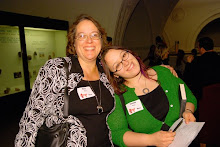This year has afforded me many more opportunities to wallow than I’m really comfortable with. It seems that every week or two there is some enormous issue that saps 90% of my mental energy, and gives me another reason to feel sorry for myself. My grandmother died a few weeks ago, shortly before that my sisters and I found out some news that upset us. Since then we’ve celebrated Pesach without my mother, and found out about a number of deaths and illnesses in our community, as well as upcoming simchas among our community and friends. Even good things are still tinged with this sense of strangeness, a foreign and empty feeling I’ve come to know as I go through life constantly thinking about how my mother would have reacted to a piece of news or a major historical event.
 It’s not difficult to imagine what my mother would have said about most of these things. I knew her very well, of course, but these have tended to be events to which there isn’t likely to be a variety of responses. She would have been sad to hear that some of our friends are sick, and would have mourned my grandmother's death. She would have grinned and hugged those who are engaged, married and expecting babies. But knowing what she would have thought and said is no consolation at all. The reason we have friends and the reason we cling to our families is not to hear the words we all expect at happy and sad occasions, it’s to feel, somehow, that both joy and pain are being shared by those we love. We want to see our own feelings mirrored in others because it lightens our load when we’re downtrodden, and increases our joy when we’re happy. When my mother died, I lost perhaps the biggest and most important mirror in my life. She was the person that so many of us went to when we wanted sympathy, pride, love, acceptance and even grief reflected back at us. And like all good mirrors, though she most often reflected back what you already knew or thought, she was unafraid to tell people when they were being unreasonable, and needed to shape up.
It’s not difficult to imagine what my mother would have said about most of these things. I knew her very well, of course, but these have tended to be events to which there isn’t likely to be a variety of responses. She would have been sad to hear that some of our friends are sick, and would have mourned my grandmother's death. She would have grinned and hugged those who are engaged, married and expecting babies. But knowing what she would have thought and said is no consolation at all. The reason we have friends and the reason we cling to our families is not to hear the words we all expect at happy and sad occasions, it’s to feel, somehow, that both joy and pain are being shared by those we love. We want to see our own feelings mirrored in others because it lightens our load when we’re downtrodden, and increases our joy when we’re happy. When my mother died, I lost perhaps the biggest and most important mirror in my life. She was the person that so many of us went to when we wanted sympathy, pride, love, acceptance and even grief reflected back at us. And like all good mirrors, though she most often reflected back what you already knew or thought, she was unafraid to tell people when they were being unreasonable, and needed to shape up.
I think about this idea often as I say Kaddish at minyan, because I am not at all sure how my mother would have reacted to my frustrations and the theological confusion I now feel about saying this mourning prayer. I remember one or two conversations we had about her own experiences saying Kaddish for her father, but I was 14 at the time, and didn’t have any concept of what the experience would be like for an adult. I still don’t think I have a concept of what it’s like to say Kaddish when you’re in your forties and fifties. So I don’t know what she would have said if I would have told her that I find myself resenting going to shul, bored and angry during most services. Would she have shared my frustrations, or would she have reminded me of the history and significance of the Kaddish through centuries of Jewish life, and of her own commitment when her father died? I can see either. Or actually, neither.
I feel sorry for myself, again.
[The photo is of me and my mom when I was about eight years old. I chose it because I think we look so much like each other—mirror images, if you will.]
Cross-posted at Mixed Multitudes.




1 comment:
*hug*
Having lost my dad when I was 32, I feel like each person's age at the time of mourning a parent is less relevant than what their support network looks like at the time of loss.
I had a different perspective on saying kaddish and going to shul. I didn't have the same sense of eye-rolling, though I certainly can empathize with it.
My biggest eye-rolling was at other mourners who were upset at the size of the shul (in NYC) and how few people came to daily minyan to support them (esp when there were <10). These were people who didn't come with any regularity themselves before, and hopefully did afterwards (though I didn't see them when I was around in later times).
Post a Comment